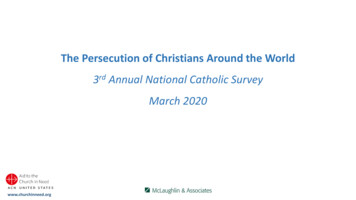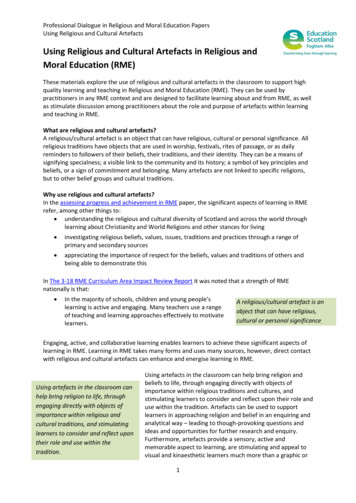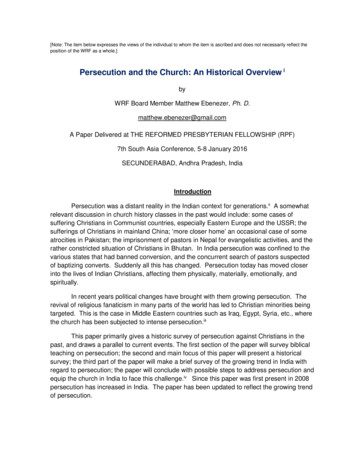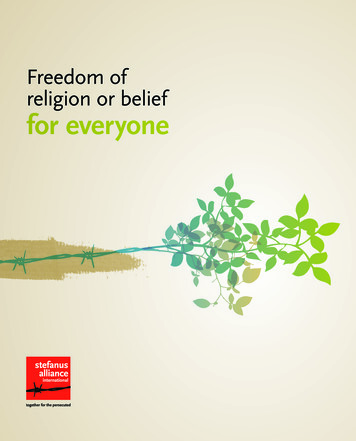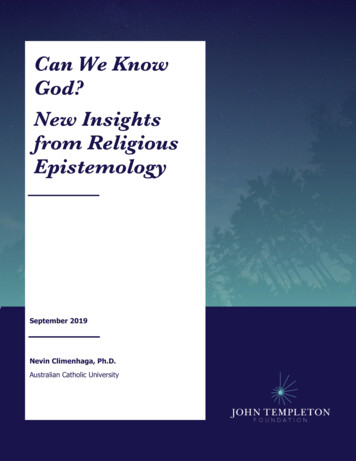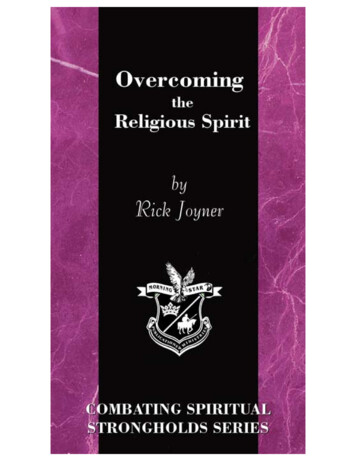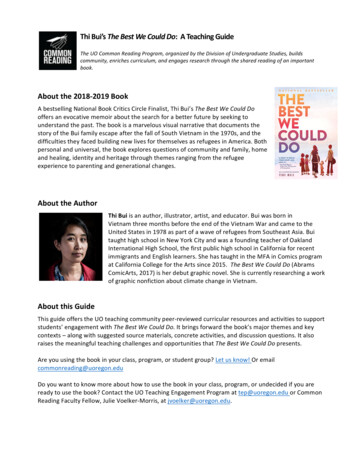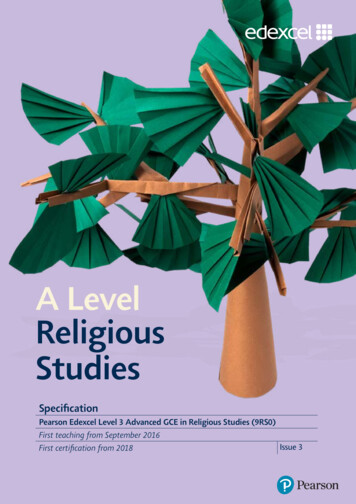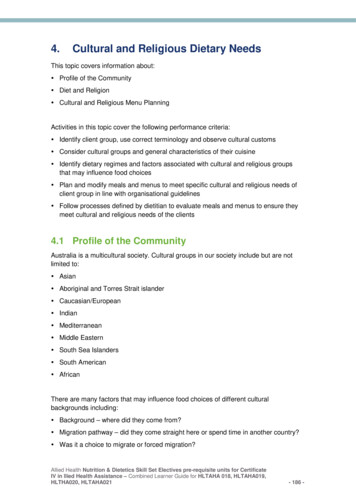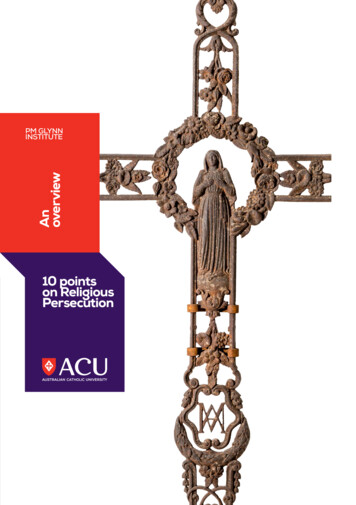
Transcription
AnoverviewPM GLYNNINSTITUTE10 pointson ReligiousPersecution
Religious freedom:a question of survival“In the Central African Republic, religiousfreedom is not a concept; it is a questionof survival. The idea is not whether oneis more or less comfortable with theideological foundations underpinningreligious freedom; rather, the issue ishow to avoid a bloodbath!” For CardinalDieudonné Nzapalainga, the Archbishopof Bangui in the Central African Republic,this is a sad and harsh reality; a reality thatis faced by millions of people on a globalscale today.When religious freedom is undervalued,ignored, discouraged or targeted, religiouspersecution sometimes follows.Many instances of religious persecutionhave been underreported or neglectedcompletely, especially in Western media.10 points on Religious Persecution isintended to draw attention to the issueand raise awareness on the plight facedby many, most often minority religiousgroups.At a time when advocacy for minoritygroups is increasing, it would beencouraging to see similar support forreligious minority groups who facepersecution because of their faith andbeliefs.Current views on the importance andrelevance of religious freedom as ahuman right are varied and complex,however what can be agreed upon is thatpersecution is never the right course ofaction, regardless of the reason.Cover image: Original iron cross from the grave of St. Mary MacKillop 1909,late-19th century, iron and timber.Australian Catholic University Art CollectionOverleaf: John Coburn, The First Day: The Spirit of of God brooded over the waters, 1977.Colour lithograph.Australian Catholic University Art Collection
What isreligious persecution?1. IT IS VIOLENT AND OPPRESSIVEDefined as an active program or campaignto exterminate, drive away, or subjugatepeople based on membership of a religiousgroup, acts of religious persecution caninclude: murder (mass or individual),kidnapping, detention, enslavement, forcedexile, expropriation of buildings, assets andfunds and damage to property, physicalassault including mutilations and battery,harsh sentences or punishments, andintimidation and threats.2. IT HAPPENS ALL AROUNDTHE WORLDIn 2018, at least 25 countries were identifiedwhere significant religious persecutionwas taking place. These countries include:Afghanistan, Bangladesh, Central AfricanRepublic, China, Eritrea, India, Indonesia,Iran, Iraq, Libya, Myanmar (Burma),Niger, Nigeria, North Korea, Pakistan, thePalestinian Territories, Russia, Saudi Arabia,Somalia, Sudan, Syria, Turkmenistan,Uzbekistan, Vietnam, and Yemen.3. IT IS PERPETRATED BYGOVERNMENTS, EXTREMISTS ANDEVEN OTHER RELIGIOUS GROUPSState and non-state bodies are usuallyresponsible for religious persecution. Inplaces like China, Myanmar, North Koreaand Saudi Arabia, to name a few, religiousminorities are predominantly targeted bytheir governments.In Afghanistan, Iraq, Niger, Nigeria andSomalia religious minorities are targeted bynon-state groups such as extremists.In some countries like India, Indonesia,Pakistan, Syria and Yemen groups aretargeted not only by extremists but also bythe government. Interestingly, it is not justnon-religious groups targeting religiousminorities, as in China or North Korea.In many countries including Myanmar,Pakistan, Saudi Arabia and Syria, religiousmajorities in certain regions are responsiblefor persecuting religious minorities.4. IT IS NOT ONLY DRIVEN BYRELIGIOUS DIFFERENCESIt is important to highlight that differencein faith is not the only driver of religiouspersecution. The historical background ofa particular region, and its relationship withthe State, is often vital to understandinghow religious persecution comes about.The legal and social restrictions that areplaced on religious freedom within acountry are also important factors.These are shaped both by governmentsand social groupings, and are informedby a broader range of socio-political factorsincluding religious regulations, nationalismand fundamentalism. This can often takethe shape of ethnic subjugationand discrimination.Ethnic cleansing and genocide has alsotaken place in recent history: in Myanmarwith the state persecution of Rohingyas;in Iraq through the persecution of Yazidisby Islamic State Group; and in Nigeriawith the persecution of Christians by BokoHaram and Fulani jihadis.5. IT AFFECTS CHRISTIANSConservative estimates suggest that260 million Christians were subjectedto religious persecution in 2017-18; thelargest group by number targeted byreligious persecution.Christian minority groups face persecutionin many countries, but some of the worstplaces include: Afghanistan, India,Iraq, Libya, Nigeria, North Korea, thePalestinian Territories and Syria. Of these,
North Korea is considered to be one of theworst countries in the world for violationsof human rights and perpetrating religiouspersecution. While the North Koreanconstitution protects people’s freedomof religion in principle, this only extendsto a handful of state-controlled housesof worship permitted to exist. All otherreligious activities outside of this domainare heavily regulated.have ‘graduated’ from these re-educationcamps are being forced to work in factorieswhich are in the supply chain of at least 83well-known companies including: Amazon,Apple, BMW, Dell, General Motors, Google,H&M, Land Rover, Microsoft, Nike, Puma,Sony, Toshiba, Volkswagen and Zara.The North Korean regime actively seeks outChristians practising their religion in secretand imprisons those that they apprehend,along with their families, in political prisoncamps. There they endure forced labour, inviolation of international law, on minimalrations, causing extreme fatigue andsickness or even death. Estimates suggestthat 25 per cent of Christians in NorthKorea are held in these prison camps wherethey are heavily persecuted, even more sothan other prisoners.Evidence suggests that anti-Semitism isincreasing around the world, which has ledto a rise in Jewish migrants to Israel. Thisrise in anti-Semitism has been documentedin countries including France, Germany,Iran, Norway, Sweden, the United States ofAmerica and Yemen.6. IT AFFECTS MUSLIMSMany Muslim communities also facepersecution, not only because of theirreligious beliefs but because of their ethnicand cultural origins as well.In China, estimates suggest between oneand two million Uyghurs and membersof other Turkic Muslim minorities havedisappeared into a vast network of reeducation camps in the far west regionof Xinjiang since 2017. Inside the campsdetainees are subjected to politicalindoctrination, forced to renounce theirreligion and culture and, in some instances,reportedly subjected to torture.In the name of combating religiousextremism Chinese authorities have beenactively remoulding the Muslim populationin the image of China’s Han ethnic majority.A recent report suggests that trainees who7. IT AFFECTS JEWS AND OTHERRELIGIOUS COMMUNITIESAfter the 2015 Hyper Cacher attack inFrance, where four Jewish people werekilled and a number were taken hostage at akosher supermarket, a record 7,900 Jewishpeople emigrated to Israel, with many ofthem citing increased fears of anti-Semitismas their reason.While attacks on the Jewish populationtoday rarely fall into the category ofpersecution, discrimination and growinghatred towards Jewish populations is onthe rise leading in some instances to Jewishpeople concealing their faith in public toavoid harassment.While religious persecution aimed at otherreligious minorities like the Rohingyas inMyanmar and the Yazidis in Iraq has beenwell-documented, religious persecution ofother minority groups often go unnoticed,such as the suppression of Buddhists inTibet and Hindus in Yemen.
8. IT TARGETS WOMEN WITH SEXUALVIOLENCESexual violence towards women and younggirls is a growing concern around theworld. Rape is often used as a means ofpunishment, humiliation and degradation,and women of faith are often targeted.Where there is religious persecution, there isoften rape.Sources indicate that countries of particularconcern include: India, Iraq, Libya,Myanmar, Nigeria, North Korea andPakistan. In some instances, women arealso forced into sexual slavery. If they arefortunate enough to escape, shame andstigma from within their own communitiesoften follows.In 2014, 17 year old Esther was kidnappedfrom her village in Nigeria’s Borno State bymembers of Boko Haram. When she wouldnot renounce her Christian faith she wasrepeatedly raped and eventually conceivedand gave birth to her daughter in captivity.When she and her daughter were rescueda year later, she was not prepared for thepersection that she faced from within herown community. Even family members werereluctant to welcome her back. Sadly, whatEsther endured at the hands of her captorsand from her own community is not anisolated incident.9. IT DRIVES PEOPLE FROM THEIRHOMELANDSThe world is witnessing the highest levels ofdisplacement of peoples on record. Estimatessuggest that at the end of 2018 approximately70 million people were forced from theirhomes by conflict and persecution. Furtherestimates suggest that 20-30 million wererefugees, 3.9 million were stateless and 3.5million were asylum seekers.While religious persecution is not the onlyfactor driving people from their homelands,it is often a factor that is rarely discussedor acknowledged. Religious persecutionhas forced Christians from China, Iraq,Libya, Nigeria, North Korea, the PalestinianTerritories, Sudan and Syria, Yazidis fromIraq and Rohingya from Myanmar.While these people often struggle to accessbasic rights in their new homelands,and often face racism, hatred and otherhostilities, the greater issue here is thedestruction of communities.Communities and traditions that spangenerations are being destroyed andtraditional ways of life annihilated. Thisin turn devastates a person’s sense ofbelonging; something that is of greatimportance to all of us.10. IT CAN BE RESISTEDWhile the situation is dire for many,jurisdictions and organisations aroundthe world continuously monitor religiouspersecution and offer recommendationsfor a better way forward, including Aidto the Church in Need, the United StatesCommission on International ReligiousFreedom, the Foreign and CommonwealthOffice in the United Kingdom, Open Doorsand many others.In Australia, for example, Aid to the Churchin Need has organised Red Wednesdayin November, when places of worshipand other public buildings are lit up inred to remember the victims of religiouspersecution.On 22 August 2019, the United NationsGeneral Assembly adopted a resolutionproclaiming the International DayCommemorating the Victims of Acts ofViolence Based on Religion or Belief. Itstrongly condemned continuing violence
and acts of terrorism targeting individuals,including persons belonging to religiousminorities, on the basis of or in the name ofreligion or belief.NotesThe Secretary-General of the UnitedNations, António Guterres declared that theday was an opportunity to reaffirm supportfor the victims of violence based on religionand belief, adding that “We demonstratethat support by doing all in our power toprevent such attacks and demanding thatthose responsible are held accountable”.1. Aid to the Church in Need, ReligiousFreedom in the World: ExecutiveSummary (2018).RELIGIOUS PERSECUTION: A THREATTO OUR SHARED HUMANITYAt the beginning of 2018, Pope Francisoffered his monthly prayer intention forpersecuted religious minorities in Asia. Henoted that the persecution which Catholicsface is a danger which also confronts otherminority religions. The different religioustraditions share a desire for “Wisdom, truthand holiness” Pope Francis said. “When wethink of those who are persecuted for theirreligion, we go beyond differences of rite orconfession; we place ourselves on the sideof the men and women who fight to avoidrenouncing their religious identity.”Religious persecution is not a problem justfor those who have faith. It is a threat toour shared humanity. In the face of thisthreat, not only justice but also solidarityappeal to us to stand on the side of thepersecuted. It is an appeal which should notgo unanswered.The information in 10 points on ReligiousPersecution has been gathered from thefollowing sources:2. Aid to the Church in Need, ReligiousFreedom in the World: Report (2018).3. United States Commission onInternational Religious Freedom,Annual Report (2019).4. International Bar Association, Inquiryon Crimes Against Humanity in NorthKorean Political Prison (December,2017).5. Xiuzhong Xu, Vicky et al., “Uyghursfor sale: ‘re-education’, forced labourand surveillance beyond Xinjiang”,International Policy Cyber Centre ReportNo. 26/2020 (2020).6. Mu Xuequan, ‘China Focus: Xinjiangdetermined in counter-terrorism,deradicalization, maintainingdevelopment’, Xinhua Net (December,2019), http://archive.ph/NkNJU7. Joint Public Issues Team, “ReligiousPersecution” (2020), uspersecution/8. UNHCR, Global Report (2018).9. United Nations, “International DayCommemorating the Victims of Acts ofViolence Based on Religion or Belief”, (22August, 2019), lenceday/10. United Nations News, “World muststamp out persecution of religiousgroups, Guterres declares on new UNDay” (22 August, 2019), https://news.un.org/en/story/2019/08/1044751
PM Glynn Institute - public policy for the common goodpmg@acu.edu.auwww.pmglynn.acu.edu.auThis information has been researched and compiledby Samantha Dunnicliff, Policy Researcher, PM Glynn Institute.CRICOS registered provider: 00004GThe PM Glynn Institute was established by ACU in early 2016 as apublic policy think tank to analyse public policy issues of concern tothe Catholic church and the wider community.Disclaimer (June 2020): Information correct at time of printing. The Universityreserves the right to amend, cancel or otherwise modify the content without notice.
the world continuously monitor religious persecution and offer recommendations for a better way forward, including Aid to the Church in Need, the United States Commission on International Religious Freedom, the Foreign and Commonwealth Office in the United Kingdom, Open Doors and
